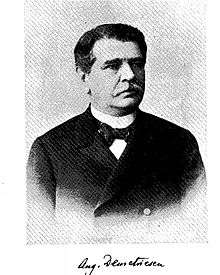Anghel Demetriescu
| Anghel Demetriescu | |
|---|---|
 | |
| Born |
October 5, 1847 Alexandria, Wallachia |
| Died |
July 18, 1903 Karlsbad, Austro-Hungary (now Czech Republic) |
| Resting place | Bellu Cemetery |
| Nationality | Romania |
| Alma mater | National College "Sfântul Sava" of Bucharest |
| Occupation | Historian and Writer |
| Spouse(s) |
1873: Maria Popovici (divorced 1882) 1884: Emma Gluck (deceased 1902) |
| Children |
Cordelia Demetriescu Theophil Demetriescu |
| Parents |
|
Anghel Demetriescu (Alexandria, Teleorman; October 5, 1847 - Karlovy Vary; July 18, 1903) was a Romanian historian, writer and literary critic, who became a member of the Romanian Academy in 1902.
Childhood and studies
Anghel Demetriescu was born on October 5, 1847 in Alexandria, province of Teleorman, Romania, then under the Ottoman Empire. He was the son of Dumitru Simion, a dyer who owned a small dying studio in the city, and Chrysanta Simion (née Velleanu), the latter who hailed from a wealthier family, her brother being a doctor who worked in Bucharest. It is speculated that Anghel was unsatisfied with his family name and thereby changed it to Demetriescu. His given name was given to him by his godfather, Anghel Dudrea of Alexandria. Not even his given name satisfied him, as he would often sign his name Ang. Demetriescu.
Being the third of nine children of a modest family, Anghel Demetriescu had a rough upbringing. He was nevertheless a brilliant student in primary school, to the extent that his parents were urged to encourage him to continue pursuing his studies. Consequently, they enrolled him at Școala Reală in Alexandria (which later became the secondary school Alexandru Ghica). Afterwards, he received a scholarship at Bucharest, first enrolling in the courses at Matei Basarab High School, and then at Sf. Sava High School.
Without passing the baccaulaureate, Anghel Demetriescu continued his studies at the College of Letters in Bucharest where he befriended Dimitrie August Laurian and Ștefan C. Michăilescu, forming a group that gained some notoriety in the college, where they were called "The Three". To sustain himself financially, Anghel Demetriescu worked as an educator at the Macedo-Romanian School, a position which he obtained with the help of Corneliu Diaconovich.
After completing his college courses, Anghel Demetriescu did not pass his licensing examination as he also did not pass the baccalaureate exam at the culmination of high school. As a result, some contemporaries considered him self-educated. V.D. Păun, one of his close friends and director and professor of Romanian language and literature at the Gheorghe Lazăr High School in Bucharest commented this in regards to Anghel Demetriescu:
"Demetriescu was not exactly what one would call self-educated, as some determined him to be and others understood him to be. It is true that he did not possess any academic titles, not even the baccalaureate. He became a professor in 1869, a time when simply graduating high school was still sufficient for competing for a chair at a faculty, whether secondary or university."
After finishing his studies at the College of Letters, Anghel Demetriescu began his didactic and publishing activity. However, in 1878, through a competition at the Ministry of Cults, he receives a scholarship for foreign studies of philology and leaves for Berlin to complete his literary and historic studies.